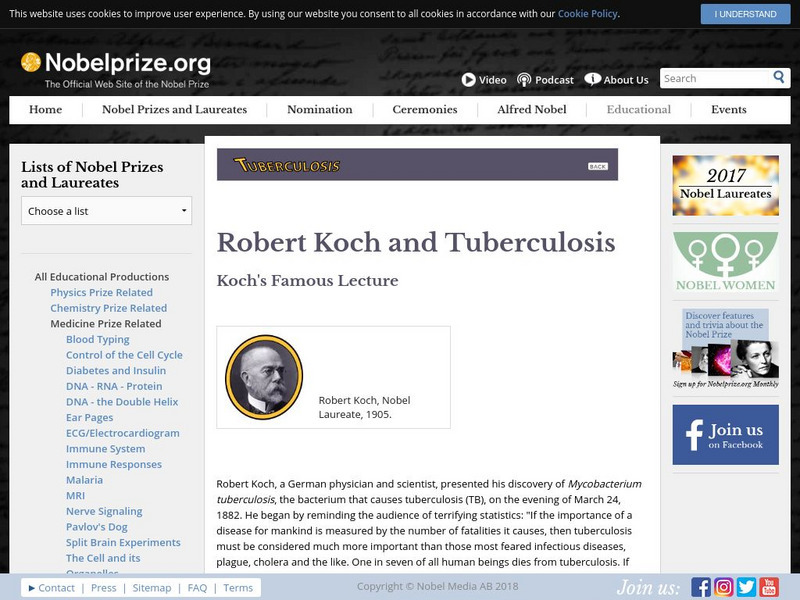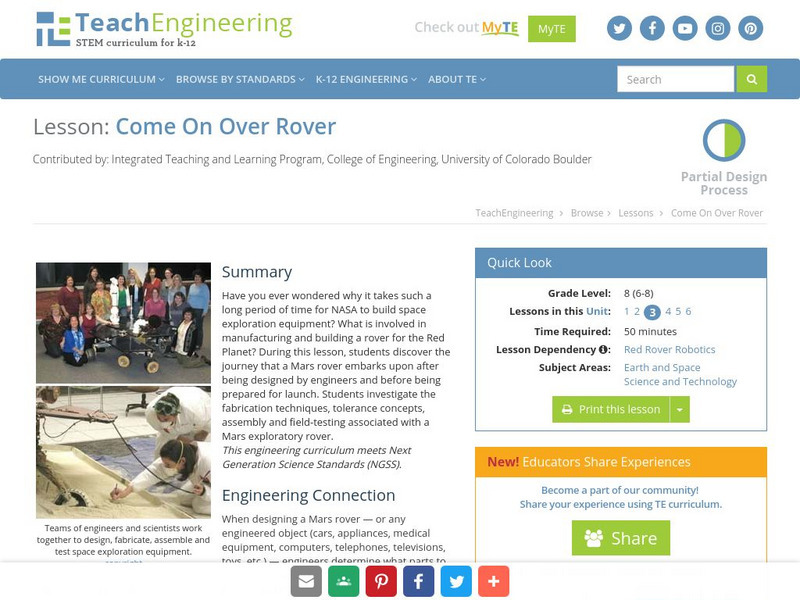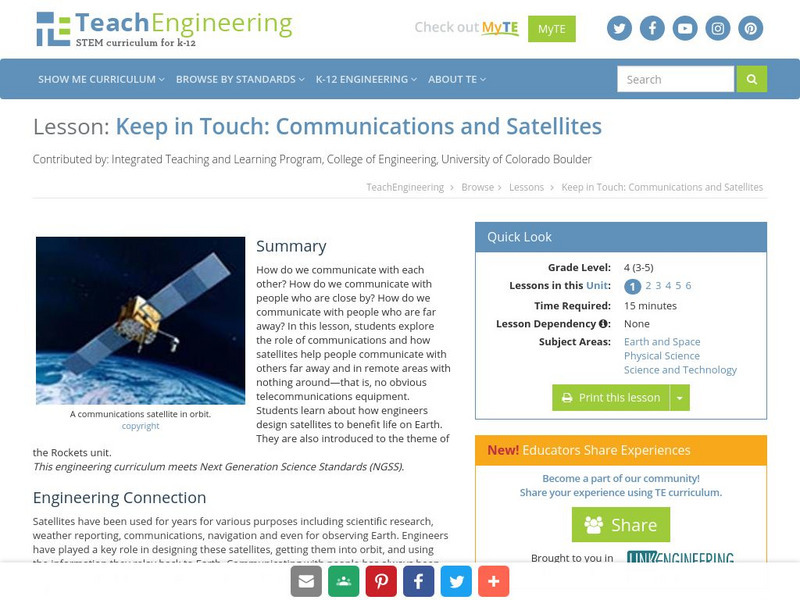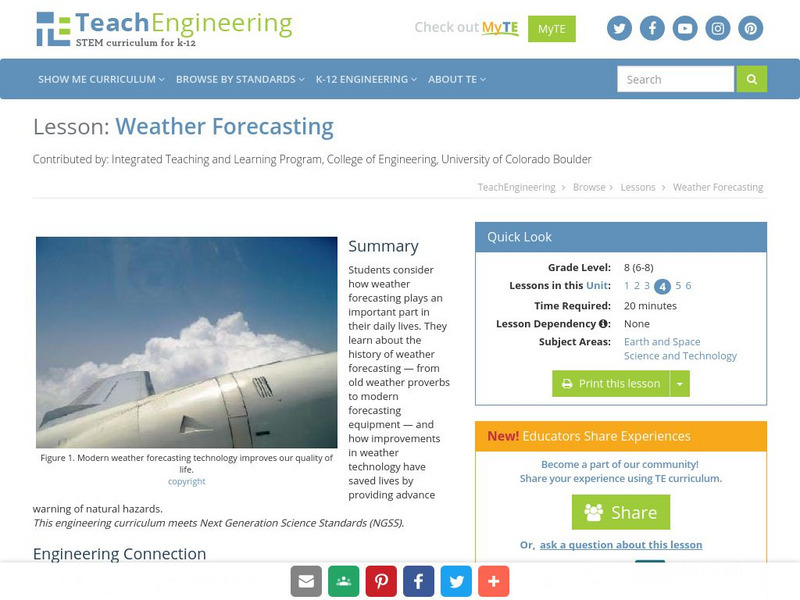Nobel Media AB
The Nobel Prize: Robert Koch and Tuberculosis
In 1905 scientist Robert Koch gave a famous lecture on his discovery of the tuberculosis bacterium. He demonstrated and explained his work, bringing his entire laboratory equipment and tissue samples for the audience to examine, and left...
Curated OER
Science Kids: Science Images: Fermi National Accelerator Laboratory
This photo shows the Fermi National Accelerator Laboratory. The Main Ring and Main Injector can easily be seen from the air, as well as the circular ponds that dissipate waste heat from the various equipment.
Alabama Learning Exchange
Alex: Safety in the Automotive Service Technology Lab
This instructional activity will provide students with the required practices and procedures for working safely in the automotive service technology laboratory. Students will learn about required Personal Protective Equipment [PPE], safe...
Lawrence Berkeley National Laboratory
Berkeley Lab: Radioisotope Power Generation
This is an article about finding the proper element to develop a radioisotope power generator to provide a power source for equipment that is too remote or inaccessible for replacement such as satellites.
TeachEngineering
Teach Engineering: Show Me the Money
Young scholars learn about the major factors that comprise the design and construction cost of a modern bridge. Before a bridge design is completed, engineers provide overall cost estimates for construction of the bridge. Students learn...
TeachEngineering
Teach Engineering: Move Your Muscles!
This lesson covers the topic of muscles. Students learn about the three different types of muscles in the human body and the effects of microgravity on muscles. Students also learn how astronauts need to exercise in order to lessen...
TeachEngineering
Teach Engineering: Come on Over Rover
Have you ever wondered why it takes such a long period of time for NASA to build space exploration equipment? What is involved in manufacturing and building a rover for the Red Planet? During this lesson, students will discover the...
TeachEngineering
Teach Engineering: Tsunami Attack!
Students learn about tsunamis, discovering what causes them and what makes them so dangerous. They learn that engineers design detection and warning equipment, as well as structures that that can survive the strong wave forces. In a...
TeachEngineering
Teach Engineering: Keep in Touch: Communications and Satellites
How do we communicate with each other? How do we communicate with people who are close by? How do we communicate with people who are far away? In this lesson, students will explore the role of communications and how satellites help...
TeachEngineering
Teach Engineering: Mercury and Venus
Young scholars explore Mercury and Venus, the first and second planets nearest the Sun. They learn about the planets' characteristics, including their differences from Earth. Students also learn how engineers are involved in the study of...
TeachEngineering
Teach Engineering: Weather Forecasting
Students begin this lesson plan by considering how weather forecasting plays an important part in their daily lives. They learn about the history of weather forecasting -from old weather proverbs to modern forecasting equipment - and how...
Read Works
Read Works: "Seven Minutes of Terror," Eight Years of Ingenuity
[Free Registration/Login Required] An informational text about engineering the landing equipment on the Mars Rover. A question sheet is available to help students build skills in reading comprehension.
Dartmouth College
Dartmouth College: P H Meter Analog
Use this site to find out what a pH meter is and how to use it in this informative and concise site.
Dartmouth College
Dartmouth College: Digital P H Meter
This site explains how a digital pH meter uses an electrode to measure the pH of a solution Find out how to use this instrument in this informative site.
Dartmouth College
Dartmouth College: Chem Lab: Flasks, Beakers, & Graduated Cylinders
Find out the uses for Erlenmeyer flasks and beakers and graduated cylinders in this informative site.
Dartmouth College
Dartmouth College: Pipet
A concise but informative explanation of what a pipet is and how to use a pipet bulb.
Dartmouth College
Dartmouth College: Top Loading Balance
Use a top loading balance to weigh solid material when a precision of 0.1 is adequate. Find out how to operate this instrument in this concise site.
Dartmouth College
Dartmouth College: Chem Lab: Repipet
Learn what a repipet is and how it is used in this brief but informative site.
Dartmouth College
Dartmouth College: Chem Lab: Volumetric Flask
What is a volumetric flask? What does it look like? How is it used? These questions are answered in this concise and informative site.
Dartmouth College
Dartmouth College: Chem Lab: Spectronic 20 Analog
This site explains how a Spec. 20 spectrometer measures the amount of visible light absorbed by a colored solution. Requires QuickTime plug-in for some features.
Dartmouth College
Dartmouth College: Chem Lab: Digital Spectrometer
This site explains how a digital spectrometer measures the amount of visible light absorbed by a colored solution.
Dartmouth College
Dartmouth College: Chem Lab: Scanning Spectrometer
The scanning spectrometer measures absorbance vs. wavelength for liquid samples. Directions on how to use this instrument are provided here.
National High Magnetic Field Laboratory
Magnet Academy: Fourier Transform Ion Cyclotron Resonance (Ft Icr)
FT-ICR is a powerful type of mass spectrometry, co-invented by the Magnet Lab's Alan Marshall, particularly suited to identifying heavy molecules. (Java tutorial)
National High Magnetic Field Laboratory
Magnet Academy: Mass Spectrometer (Dual Sector)
Mass spectrometers are machines that give scientists a look at the composition and origin of a material by analyzing and quantifying its atoms and molecules. This tutorial shows how a dual sector mass spectrometer works. (Java tutorial)
Other popular searches
- Basic Laboratory Equipment
- Science Laboratory Equipment
- Laboratory Equipment Sheet
- Laboratory Equipment Uses
- Common Laboratory Equipment















